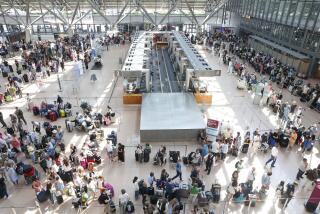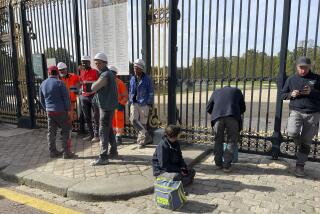More severe weather adds to travel woes in Europe
- Share via
Reporting from Paris — Christmas plans were canceled Friday for thousands of travelers unable to make it home for the holidays after heavy snow caused fresh transportation chaos across parts of Europe.
As the third wave of unexpectedly severe weather in a month struck, ill-equipped airports, and treacherous road conditions conspired to ruin the festive spirit for those stranded by canceled flights, long traffic jams and slowed trains.
Officials at London’s Heathrow airport, one of the worst hit by last weekend’s snow, announced flights were back to a normal schedule in order “to get people home for Christmas,” but storm clouds had gathered elsewhere on the continent.
At Charles de Gaulle airport in Paris, 650 flights were canceled because of the weather. To add to frustrations, about 2,000 passengers were moved from one of the airport’s terminals because of fear that the roof would collapse under the weight of more than 7 inches of snow.
French Transportation Secretary Thierry Mariani said some travelers probably would be forced to spend the night before Christmas at the airport.
He also acknowledged that the situation had been made worse by a shortage of glycol, used to de-ice aircraft, caused by a strike at the main production center in France. Emergency supplies sent by truck from Germany were held up because of deep snow on the roads, but the Associated Press reported that two shipments arrived by air from the United States.
One angry passenger in a long line at the Air France counter expressed the fury of many: “It’s useless. There’s zero organization and they have no information,” she told Agence France-Presse news service.
Several roads in the north of France were closed, buses were halted, trains were overcrowded and delayed, and about 10,000 homes were left without electricity in the east and south.
With more snow forecast and European airports and train terminals still struggling to clear out passengers stranded by the cancellations of 2,000 flights last weekend, there was little Christmas cheer amid the chaos.
A slight rise in temperatures in Britain meant about 90% of flights were operating from Heathrow airport, but the picture was bleak elsewhere. Bitter cold caused problems in Scandinavia, and 6 inches of snow fell across Denmark, where icy winds brought trains in southern regions to a halt.
There was freezing rain in parts of Germany and some roads were covered with almost an inch of ice, causing numerous accidents. Officials in the north warned people not to drive unless absolutely necessary and said extra trains would be scheduled to handle the surge in passengers.
Weather-related problems also were reported at airports in Belgium, Germany and Switzerland.
European airline operators have urged the European Union to establish “clear responsibilities for all concerned” in the event of bad weather. The demand came after widespread criticism over the handling of delays because of the severe weather last weekend.
Ulrich Schulte-Strathaus, secretary-general of the Assn. of European Airlines, told reporters: “No one doubts that a severe blizzard can close an airport nor that it takes time for a heavy snowfall to be cleared from runways and [for] aircraft to be de-iced. But it does appear that a number of major airports have been taken by surprise during recent days, have reacted slowly or have lacked the equipment needed to cope with the conditions.”
Reaction to bad weather, he said, should be a “cooperative effort” involving airports, ground handlers, the airlines and the passengers.
“AEA calls on the European Commission to establish clear responsibilities of all concerned,” Schulte-Strathaus said, “so that in the case of massive service disruption, passengers do not have unrealistic expectations, and if airports, ground handling companies or other stakeholders fail to deliver the service expected of them, they are held liable.”
Britain’s aviation regulator said it had written to several airlines about the “unacceptable” failure to properly feed and accommodate stranded passengers.
Willsher is a special correspondent.
More to Read
Sign up for Essential California
The most important California stories and recommendations in your inbox every morning.
You may occasionally receive promotional content from the Los Angeles Times.













